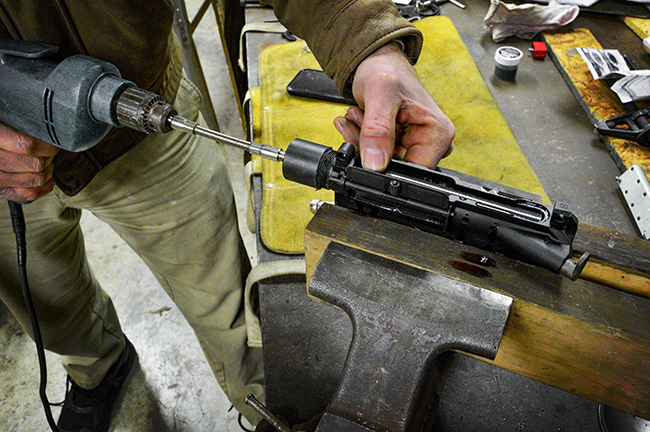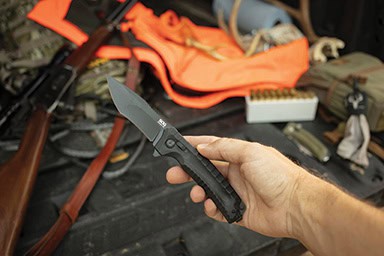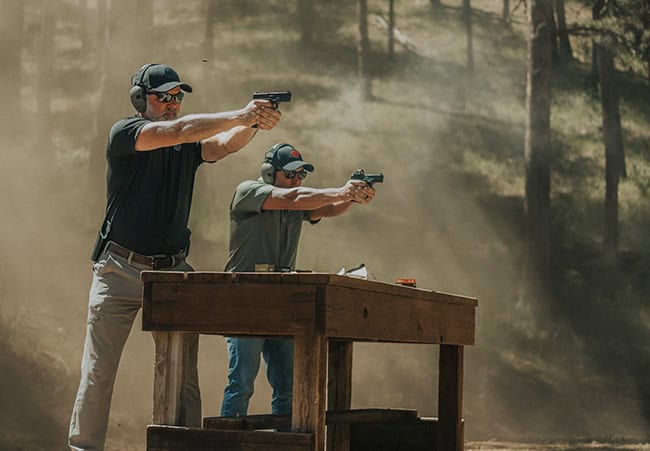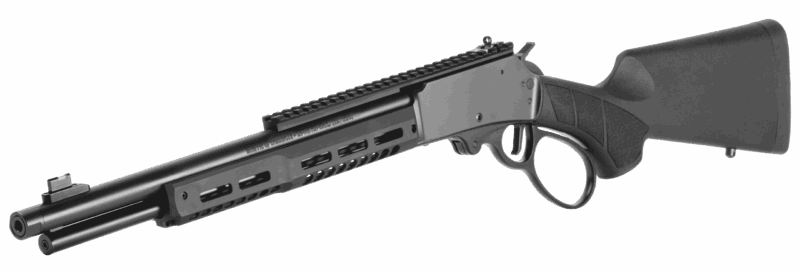Make Gunsmiths Your Compound Asset
Full-Service Gun Shops Gain Edge Over Competitors
You’re considering hiring a gunsmith to perform an increasing number of service requests, but is a gunsmith really a worthwhile investment for your business?
Any new hire is a value judgment, but a gunsmith is a highly specialized position. If utilized strategically, it won’t take long before a gunsmith begins helping you achieve your short-term and long-term business goals.
The Lifetime Value Of A Customer Is … ?
Gene Kelly, founder and president of the American Gunsmithing Institute in Napa, Calif., has trained thousands of gunsmiths with his unique online courses. He contends hiring a gunsmith is a long-game move capable of generating immediate profits while enhancing the long-term value of your brand. It’s a visionary step that can distinguish a full-service firearms retailer from a mere seller of guns and accessories.
“It builds relationships and ‘stickiness,’” Kelly said. “It makes you different than the firearms store down the street that might sell guns 5% cheaper than you do.”
The added value of reputation creates customer loyalty and helps ensure customer retention, which can be passed down through generations of customers, according to Kelly.
“One thing you have to ask yourself is what is the lifetime value of a customer?” he suggested. “It’s something most people in our industry don’t think about, but people in other industries do. If you have a qualified gunsmith — not a hack or a parts swapper — who’s dedicated to doing a good job, it builds your reputation. People who ordinarily wouldn’t go into your shop would be referred by friends. ‘They did my cleaning and they did a good job. They offered me a sight upgrade, which I did. It was reasonable and I’m happy.’ So again, what is the lifetime value of a customer?”
This is rosy, but will your gunsmith generate enough additional income to justify his position?
“If you have 100 customers who spend $1,000 with you (because of your gunsmith), there’s your $100,000 in labor,” Kelly pointed out. “It’s not a lot of money for people to spend customizing or repairing their guns because most of our customers have more than one gun. Again, it goes back to: what is the lifetime value of a customer?”
Full-Service Benefit
Kevin Poley, owner of Crossfire Gunsmith & Firearms in Lexington, S.C., has distinguished his business as a premier firearms resource in South Carolina’s Midlands region. His experience illustrates Kelly’s compounding asset theory.
“A common thing here is when someone is looking around and sees a red dot that can go on a pistol,” Poley said. “Then they’ll ask, ‘Can you cut slides?’ Absolutely! They can buy a red dot, and then we can actually mill their slide. I get paid to sell the red dot and to install it.”
Poley said his reputation is such that the Lexington, S.C., police department contracted with him to install red dots on 62 service weapons.
“After milling it, you’ve got to protect the metal, so we Cerakoted all those firearms, too,” Poley shared, praising his Cerakote specialist, Chris Trulock.
It’s just one example of the full range of gunsmith services Poley offers to a broad, diverse range of customers.
“We’re pretty much an all-around gunsmith gun store,” he noted. “We do everything, from repairing and restoring your gun to tracking down any gun you’re looking for. We’re actually a gun store and machine shop, a complete go-to store.”
Importantly, a gunsmith knows the legal limitations of what he can and cannot do to a gun. For example, a gunsmith or a retailer cannot build a firearm for a customer if the business does not have a manufacturer’s license. This knowledge will keep a business out of serious legal trouble by refusing to build a gun for a customer who brings in the components to do so.
An experienced gunsmith also knows arcane regulations a hobbyist working the counter would not know.
“A guy brought me a gun with U.S. markings on it. It’s a shotgun that came off the [decommissioned aircraft carrier] USS Intrepid,” Poley recalled. “The owner thought it was a Marine security detail shotgun. He wanted me to alter it and put a scope on it. I said, ‘No, I can’t do that. I can clean it for you, but I can’t modify it because it’s still property of the U.S. government. If you alter it, you’re going to jail.”
Poley said cleanings are a bread-and-butter service. And because people often take guns to a gunsmith as a last resort after hopelessly botching a garage repair job, this contact often leads to other retail activity.
“We actually have a good customer base,” he said. “They bring stuff in. We fix it. It’s great. But then he’s got this other gun he wants to bring in. Customers come in multiple times bringing us guns they don’t shoot because they don’t work anymore.”
This generates a lot of five-star reviews online. Poley said it’s very important because of his aggressive online presence.
“It’s important to us to have a good review,” he confirmed. “When people are searching for a gunsmith, we pop up at the top of the list for our area. When we get a negative review, I’m calling the guy and asking what happened. One guy came in. We cleaned it and got it in working order. When we gave it back to him, he told us, ‘This isn’t my gun; it’s too nice to be my gun.’ Reputation is everything in this business.”
A “Little Gray” Is Okay
Mandi Sano, president of The Gun Doctor in Roselle, Ill., occupies a unique niche as a full-service firearms business in the most hostile region of one of the most hostile gun states. Sano’s father established the Gun Doctor in 1972, and he grew the business into a generational powerhouse. Experience fuels the engine.
“It’s like with a pilot: you want to see a little gray hair on your gunsmith,” Sano said, laughing.
While gunsmithing can and often does translate to additional sales, Sano believes a gunsmith must be mindful of propriety. A complicated gun repair can be stressful to a customer. Suggesting other products at the time could rub a customer wrong.
“You have to be cautious when working on guns because if you have to order parts, it’s also is a secondary sale,” she explained. “I want to be kind of cautious our gunsmithing department doesn’t push add-on sales too hard. The gunsmith is here to service guns. If you have an inexperienced staff, I could see how it could turn into ‘Buy this, this and this.”
Sano’s position is also unique because the sale of AR-15 rifles is prohibited in Illinois. This removes a very popular firearm from Sano’s retail repertoire, and also from its service repertoire.
“We’re sitting under an assault weapons ban,” she said. “Before 2023, we worked on a ton of ARs. Now we can’t work on any of them.”
Besides gray hair, Sano looks for other attributes in a gunsmith. She wants to see how he works.
“I want to see how clean their bench is, but what I look for is the opposite of what you think,” she began. “I see ads for people building custom 1911s. Their benches are pristine, no tools out. I look at that and see it as a marketing video. I want to see a guy who works. I want to see bench tools on it. I want to see a bench with some use.”
The Wall Of Economics
Jim Jones, owner of J&L Gunsmithing in Chesapeake, Va., would earn Sano’s approval.
“I have so much equipment in my shop,” he said. “I have two mills. I have two lathes, a surface grinder, a belt sander, a TIG welder, a MIG welder, a bandsaw and the list goes on and on.”
Chesapeake is near the Norfolk Naval Base, one of the world’s largest military facilities. Jones suggests many sailors leave the service without having learned any practical skills to apply to a career. Many think they want to become gunsmiths, Jones said, but there’s a lot to learn on the road to proficiency.
“I’m cutting pieces of metal in my shop,” he emphasized. “I’m confident, but I can’t look up every slide or whatever to see what kind of metal it is. I estimate the speed it should be on the cutter. I can do it in 20 seconds. I turn it to that speed and start to cut, but I have experience to know if it doesn’t sound right to me, I need to tune it up so the chips coming off are perfect.”
This is where a retailer runs into the wall of economics. A person with that degree of experience probably owns his own shop, as do Jones, Sano and Poley. A gun store owner probably can’t afford this kind of experience, but he also can’t afford inexperience.
To take his business where he wants it to go, he must decide if he really can afford a gunsmith or not. Maybe he should job out his gunsmith work and hire an armorer instead.
We’ll answer that question in the final installment of this series next month.






